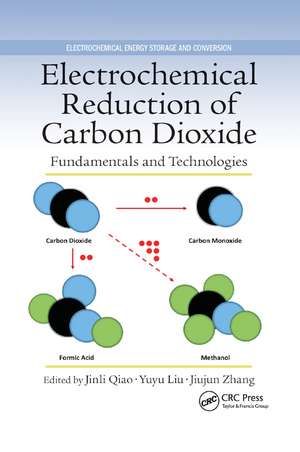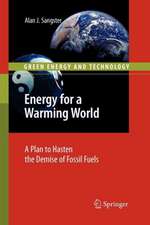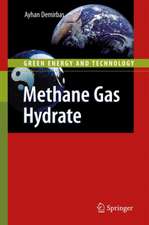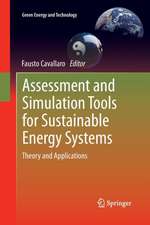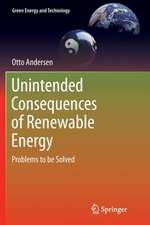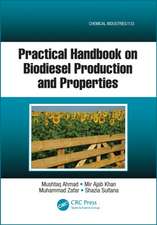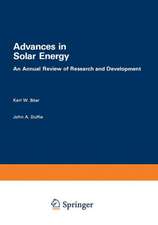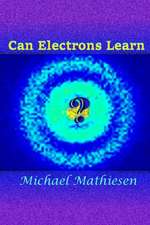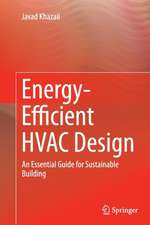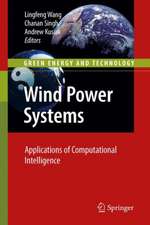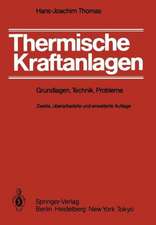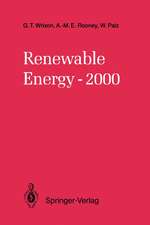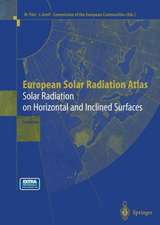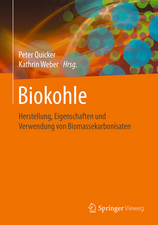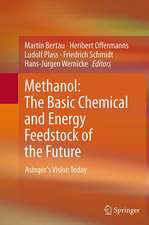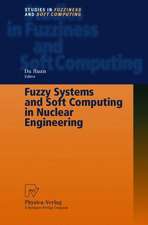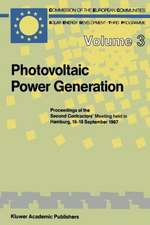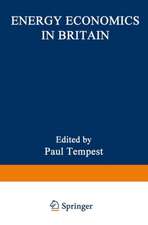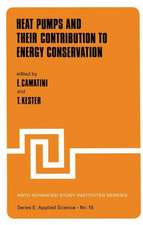Electrochemical Reduction of Carbon Dioxide: Fundamentals and Technologies: Electrochemical Energy Storage and Conversion
Editat de Jinli Qiao, Yuyu Liu, Jiujun Zhangen Limba Engleză Paperback – 10 dec 2019
Electrochemical Reduction of Carbon Dioxide: Fundamentals and Technologies is your guide to improved catalytic performance in the electrochemical reduction of carbon dioxide (CO2). Written by electrochemical energy scientists actively involved in environmental research and development, this book addresses the biggest challenge to CO2 electrochemical reduction—low performance of the electrocatalysts—and outlines practical applications for the effective use of CO2. The authors discuss the development of electrochemical energy devices and consider environmental protection on a macroscopic and microscopic scale. Presenting a systematic overview of CO2 electroreduction, they explain the fundamental principles, describe recent advances, and outline applications for future use.
In addition, the authors describe:
- The main metal electrodes used for CO2 electroreduction
- Current efficiencies for CO2 reduction products on different metal electrodes
- The electrochemical conversion of carbon dioxide to produce important chemicals
- Three categories of reaction conditions: heterogeneous catalysis, low-temperatures electrolysis, and high-temperature electrolysis
- Developments in CO2 hydrogenation reactions
- Various analysis methods
- Progresses in the theoretical electrochemical reduction of CO2
Electrochemical Reduction of Carbon Dioxide: Fundamentals and Technologies covers a variety of topics relevant to the successful use of CO2 electrochemical reduction and utilizes expert contributors at the top of their field. The book functions as a resource for students and professionals involved in materials
| Toate formatele și edițiile | Preț | Express |
|---|---|---|
| Paperback (1) | 461.03 lei 6-8 săpt. | |
| CRC Press – 10 dec 2019 | 461.03 lei 6-8 săpt. | |
| Hardback (1) | 1225.99 lei 6-8 săpt. | |
| CRC Press – 14 iun 2016 | 1225.99 lei 6-8 săpt. |
Din seria Electrochemical Energy Storage and Conversion
- 9%
 Preț: 971.41 lei
Preț: 971.41 lei - 9%
 Preț: 640.73 lei
Preț: 640.73 lei - 8%
 Preț: 404.54 lei
Preț: 404.54 lei - 29%
 Preț: 1023.72 lei
Preț: 1023.72 lei - 29%
 Preț: 999.16 lei
Preț: 999.16 lei - 29%
 Preț: 496.94 lei
Preț: 496.94 lei -
 Preț: 357.22 lei
Preț: 357.22 lei - 25%
 Preț: 556.50 lei
Preț: 556.50 lei - 24%
 Preț: 514.89 lei
Preț: 514.89 lei - 25%
 Preț: 996.92 lei
Preț: 996.92 lei - 18%
 Preț: 1394.89 lei
Preț: 1394.89 lei - 27%
 Preț: 398.29 lei
Preț: 398.29 lei - 26%
 Preț: 490.43 lei
Preț: 490.43 lei -
 Preț: 435.98 lei
Preț: 435.98 lei -
 Preț: 436.53 lei
Preț: 436.53 lei - 18%
 Preț: 1110.74 lei
Preț: 1110.74 lei - 23%
 Preț: 410.54 lei
Preț: 410.54 lei - 26%
 Preț: 370.25 lei
Preț: 370.25 lei - 12%
 Preț: 314.71 lei
Preț: 314.71 lei - 21%
 Preț: 363.58 lei
Preț: 363.58 lei - 18%
 Preț: 700.75 lei
Preț: 700.75 lei
Preț: 461.03 lei
Preț vechi: 542.39 lei
-15% Nou
Puncte Express: 692
Preț estimativ în valută:
88.22€ • 92.35$ • 72.99£
88.22€ • 92.35$ • 72.99£
Carte tipărită la comandă
Livrare economică 05-19 aprilie
Preluare comenzi: 021 569.72.76
Specificații
ISBN-13: 9780367870836
ISBN-10: 0367870835
Pagini: 394
Dimensiuni: 156 x 234 x 21 mm
Greutate: 0.45 kg
Ediția:1
Editura: CRC Press
Colecția CRC Press
Seria Electrochemical Energy Storage and Conversion
ISBN-10: 0367870835
Pagini: 394
Dimensiuni: 156 x 234 x 21 mm
Greutate: 0.45 kg
Ediția:1
Editura: CRC Press
Colecția CRC Press
Seria Electrochemical Energy Storage and Conversion
Cuprins
Introduction to CO2 Electroreduction. Thermodynamics of CO2 Electroreduction. Electrode Kinetics of CO2 Electroreduction. Catalysis of CO2 Electroreduction. Electrochemical Methods for CO2 Electroreduction. Mechanism of Catalytic and Electrocatalytic CO2 Reduction to Fuels and Chemicals. Product Analysis for CO2 Electroreduction. Modeling of Electrochemical CO2 Reduction. Photoelectrochemical Reduction of CO2 Electroreduction. Challenges and Perspectives of CO2 Electroreduction.
Notă biografică
Jinli Qiao is a professor, PhD supervisor, and disciplines leader of the College of Environmental Science and Engineering, Donghua University, China. She earned her PhD in electrochemistry from Yamaguchi University, Japan in 2004. Dr. Qiao has more than 20 years of scientific research experience, particularly in the area of electrochemical material development and energy storage and conversion. She has published numerous papers and coauthored five books/book chapters. Professor Qiao is also the organizer/co-chair and committee member of several international conferences, the guest editor for Electrochimica Acta/International Journal of Hydrogen Energy/Applied Energy, and the reviewer editor of Frontiers in Fuel Cells.
Yuyu Liu is an associate professor at the Graduate School of Environmental Studies, Tohoku University, Japan. Dr. Liu earned his PhD in environmental engineering from Yamaguchi University, Japan in 2003. He then worked at Kyushu Environmental Evaluation Association, Osaka Institute of Technology, Tokyo University of Agriculture and Technology, and Yokohama National University as a postdoctoral and research fellow. Dr. Liu has more than 10 years of experience in environmental science and technology, particularly in the areas of air quality monitoring, water and soil research, and their associated instrument development. He has published over 40 papers and over 20 conference proceedings.
Jiujun Zhang is a principal research officer and core competency leader at the Energy, Mining
& Environment, National Research Council of Canada (NRC-EME). Dr. Zhang earned his BS and MSc in electrochemistry from Peking University in 1982 and 1985, respectively, and his PhD in electrochemistry from Wuhan University in 1988. He holds more than 14 adjunct professorships, including one at the University of Waterloo, the University of British Columbia, and Peking University. Dr. Zh
Yuyu Liu is an associate professor at the Graduate School of Environmental Studies, Tohoku University, Japan. Dr. Liu earned his PhD in environmental engineering from Yamaguchi University, Japan in 2003. He then worked at Kyushu Environmental Evaluation Association, Osaka Institute of Technology, Tokyo University of Agriculture and Technology, and Yokohama National University as a postdoctoral and research fellow. Dr. Liu has more than 10 years of experience in environmental science and technology, particularly in the areas of air quality monitoring, water and soil research, and their associated instrument development. He has published over 40 papers and over 20 conference proceedings.
Jiujun Zhang is a principal research officer and core competency leader at the Energy, Mining
& Environment, National Research Council of Canada (NRC-EME). Dr. Zhang earned his BS and MSc in electrochemistry from Peking University in 1982 and 1985, respectively, and his PhD in electrochemistry from Wuhan University in 1988. He holds more than 14 adjunct professorships, including one at the University of Waterloo, the University of British Columbia, and Peking University. Dr. Zh
Recenzii
"The authors have managed to give a comprehensive overview of a field of research that attracts considerable interest from the scientific community: the electroreduction of CO2. This book is highly recommended for chemists and more generally scientists interested in the various remediation approaches that can deal with carbon dioxide."
—Daniel Guay, INRS Énergie Matériaux Télécommunication, Quebec, Canada
"This book is a very comprehensive review on electrochemical reduction of CO2. It takes into consideration all aspects on how to transform CO2 in a valuable alternative compound. All chemistry is considered: from thermodynamic aspects to catalysis, considering future challenges."
—Stefania Specchia, Politecnico di Torino, Dept. Applied Science & Technology, Italy
"I think this book is a high-quality monograph and textbook. It will help researchers and developers track the recent advances in utilizing CO2 to produce the carbon fuels by electrochemical reduction, and graduate students to understand CO2 chemical reduction technology."
—Cheng Zhong, Tianjin University, China
"This is the most comprehensive monograph I have seen about CO2 electrochemical reduction. The readers may widely include electrochemists, graduate students, and even college students."
—Andy (Xueliang) Sun, PhD, Professor, Department of Mechanical & Materials Engineering, Western University, Ontario, Canada
"The authors in this book provide a comprehensive overview of fundamentals and applications about CO2 electroreduction for graduate students, scientists and engineers in environment and energy areas. Especially, thermodynamics and electrode kinetics in this book would be very helpful to understand the CO2 electrochemical reduction. This book is strongly recommended for them to solve their research issues."
— Kunchan Lee, Showa Denko K.K., Tokyo, Japan
—Daniel Guay, INRS Énergie Matériaux Télécommunication, Quebec, Canada
"This book is a very comprehensive review on electrochemical reduction of CO2. It takes into consideration all aspects on how to transform CO2 in a valuable alternative compound. All chemistry is considered: from thermodynamic aspects to catalysis, considering future challenges."
—Stefania Specchia, Politecnico di Torino, Dept. Applied Science & Technology, Italy
"I think this book is a high-quality monograph and textbook. It will help researchers and developers track the recent advances in utilizing CO2 to produce the carbon fuels by electrochemical reduction, and graduate students to understand CO2 chemical reduction technology."
—Cheng Zhong, Tianjin University, China
"This is the most comprehensive monograph I have seen about CO2 electrochemical reduction. The readers may widely include electrochemists, graduate students, and even college students."
—Andy (Xueliang) Sun, PhD, Professor, Department of Mechanical & Materials Engineering, Western University, Ontario, Canada
"The authors in this book provide a comprehensive overview of fundamentals and applications about CO2 electroreduction for graduate students, scientists and engineers in environment and energy areas. Especially, thermodynamics and electrode kinetics in this book would be very helpful to understand the CO2 electrochemical reduction. This book is strongly recommended for them to solve their research issues."
— Kunchan Lee, Showa Denko K.K., Tokyo, Japan
Descriere
This book gives a comprehensive overview of the electrochemical reduction of carbon dioxide. It covers fundamentals and technologies, including the latest materials and newest developments. The authors address a variety of topics that include electrochemical processes, materials, components, manufacturing, and degradation mechanisms, as well as
